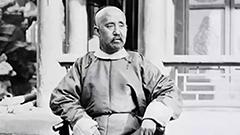As we all know, when the army at the end of the Qing Dynasty faced the army of the invaders of the upper powers, the difference in strength displayed was very obvious, and it can be said that it was repeatedly defeated.
At that time, there was a general, he led the Qing army to attack the British and French coalition forces, and finally achieved the goal of sinking 4 enemy ships, seriously damaging 6 enemy ships, killing and injuring 484 British and French allied troops, and seriously injuring the British naval commander He Bo, which was the first victory of the Qing army against foreign invaders since the Opium War.
The "Mongol Lineage" records that the monk Gelinqin was the twenty-sixth generation grandson of Genghis Khan's second brother Habtu Hasar, who was born into a declining aristocracy and was poor as a child, and worked with his father to graze cattle for the rich.
At the age of 14, the life of the monk Greenqin ushered in a turning point, and he was selected as the heir of the king of Sotnam Dob Jai County, inheriting the throne of Zhasak County, the left wing of Horqin.
Since then, the monk Greenqin has been continuously rewarded by the imperial court, and his status has risen sharply.

Fifteen years later, the monk Gelinqin became the governor of Mongolia with a yellow flag. The yellow flag is the head of the three banners, there is no king in the flag, it is personally commanded by the emperor, and it belongs to the emperor's personal soldiers.
After the death of the Daoguang Emperor, the monk Gelinqin also became one of the ministers of Gu Ming.
After the Xianfeng Emperor ascended the throne, the monk Gelinqin served as a former imperial minister. When the taiping heavenly kingdom's army invaded the Gyeonggi stronghold, the Xianfeng Emperor personally awarded the sword used by the Qing Taizu Nurhaci to the monk Gelinqin, and asked him to send troops to suppress the Taiping Heavenly Kingdom's army.
Monk Greenqin fought several battles with the Taiping Army, all of which won, and finally captured Lin Fengxiang and Li Kaifang, commanders of the Northern Expeditionary Army of the Taiping Heavenly Kingdom, both of whom were famous generals of the Taiping Heavenly Kingdom, and were always known for their bravery and good fighting, but as soon as the monk Greenqin came out of the horse, he annihilated all their troops in only two years, which was named Zhen Huanyu.
In 1858, the Qing court and the great powers were defeated in the Battle of Tianjin Dagu Haikou and signed the "Treaty of Tianjin", after the monk Greenqin knew about it, he advocated pouring all his strength to reorganize the army and drive out the Western powers, but at that time many people advocated peace, and his opinion was not adopted.
The Xianfeng Emperor knew that the monk Gelinqin was dissatisfied, and although he did not take the advice of the monk Gelinqin, he finally entrusted the affairs of the Tianjin governor Of Dagukou and the defense of Jingdong to the monk Gelinqin.
Monk Greenqin learned the lesson of the first defeat, actively prepared the fortifications of Dagu Haikou and Shuanggang, and straightened out the army, when the British and French fleets defied the dissuasion and warnings of Chinese and brazenly broke into The Dagu Pass, SangGelinqin was angry and issued a battle order to resolutely counterattack the invaders, and finally the British and French warships suffered heavy casualties and retreated after several days.
The Battle of Dagukou, commanded by Senggelinqin, was the first major victory of the Chinese army against foreign invasion since the invasion of Western capitalist powers in 1840. When Mr. Marx heard about this, he personally wrote an article to give it an affirmation.
Later, the Twist army rose up, and Xianfeng authorized the monk Greenqin to dispatch soldiers and horses from the five provinces of Zhi, Lu, Yu, Hubei, and Anhui, and ordered him to suppress the Twist army. The Twister army numbered in the hundreds of thousands, and although the monk Greenqin won many victories, he also suffered heavy losses.
In a battle, the monk Greenqin was lured by the Twister Army to the high-rise village of Caozhou in Shandong Province, and was besieged, and the monk Greenqin led a small number of his entourage to break through the siege with death, and fell on his horse on the way and fell into the wheat field. Zhang Pixiu, a sixteen-year-old boy in the Twist army, found him and beheaded him, and the life of this famous late Qing general known as the "pillar of the country" came to an end at the age of 55.
After he died in battle, the people went on strike, the alleys wept for wild sacrifices, and when the coffins returned to Beijing, there were more than seventy umbrellas for the people, and the soldiers and the people rushed to greet the sacrifices, and the cries were tremendous.